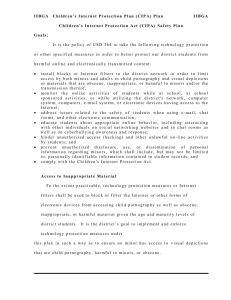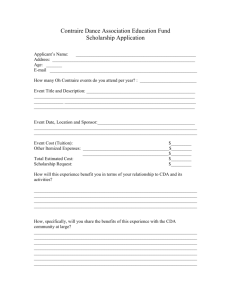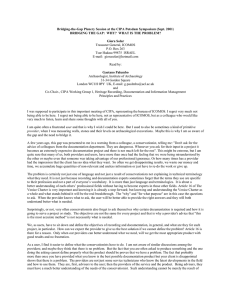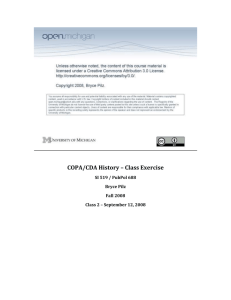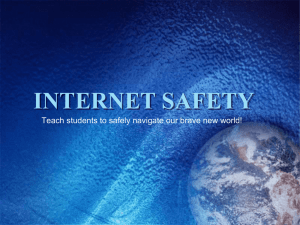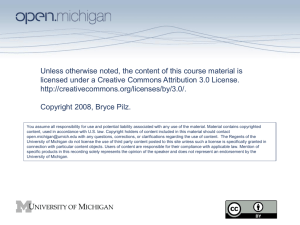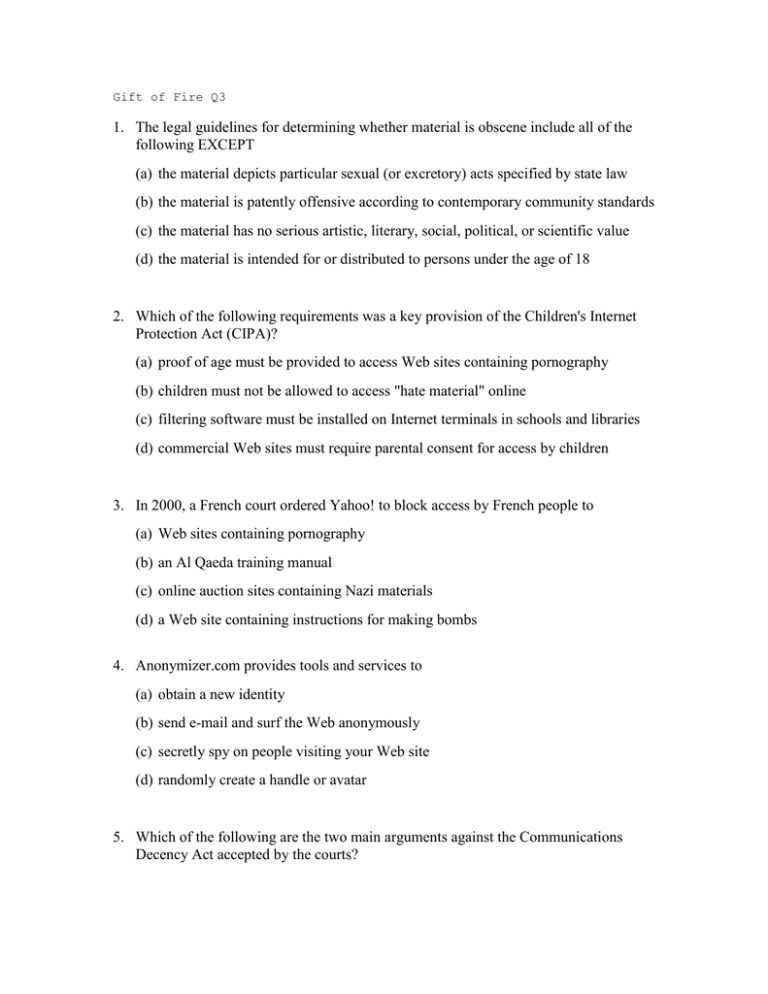
Gift of Fire Q3
1. The legal guidelines for determining whether material is obscene include all of the
following EXCEPT
(a) the material depicts particular sexual (or excretory) acts specified by state law
(b) the material is patently offensive according to contemporary community standards
(c) the material has no serious artistic, literary, social, political, or scientific value
(d) the material is intended for or distributed to persons under the age of 18
2. Which of the following requirements was a key provision of the Children's Internet
Protection Act (CIPA)?
(a) proof of age must be provided to access Web sites containing pornography
(b) children must not be allowed to access "hate material" online
(c) filtering software must be installed on Internet terminals in schools and libraries
(d) commercial Web sites must require parental consent for access by children
3. In 2000, a French court ordered Yahoo! to block access by French people to
(a) Web sites containing pornography
(b) an Al Qaeda training manual
(c) online auction sites containing Nazi materials
(d) a Web site containing instructions for making bombs
4. Anonymizer.com provides tools and services to
(a) obtain a new identity
(b) send e-mail and surf the Web anonymously
(c) secretly spy on people visiting your Web site
(d) randomly create a handle or avatar
5. Which of the following are the two main arguments against the Communications
Decency Act accepted by the courts?
(a) it was not enforceable, and it did not use the least restrictive means of accomplishing
the goal of protecting children
(b) it was too vague and broad, and it did not use the least restrictive means of
accomplishing the goal of protecting children
(c) it was too vague and broad, and it did not use community standards to determine
what would be harmful to minors
(d) it was not enforceable, and it did not use community standards to determine what
would be harmful to minors
6. Which of the following changed its name to Arcadia University in 2001 in part because
filters used to protect children blocked its Web site?
(a) Beaver College
(b) National Institute of Mental Health
(c) The Heritage Foundation
(d) None of the above
7. Many countries have tried to censor the Internet. Which country issued the following
edict in 2001: The office of communications is ordered to find ways to ensure that the
use of the Internet becomes impossible.
(a) Iraq
(b) South Africa
(c) Afghanistan
(d) Brazil
8. Which of the following limits deceptive commercial e-mail and outlines spammers'
responsibilities:
(a) the Spam Reduction Action
(b) the Electronic Communications Act
(c) the Commercial Communications Act
(d) the CAN-SPAM Act
9. Which of the following is NOT a provision of the CAN-SPAM Act that applies to
commercial e-mailers?
(a) It bans false or misleading header information
(b) It requires that unsolicited e-mail give recipients an opt-out method
(c) It requires that commercial e-mail be identified as an advertisement and include the
sender's valid physical postal address
(d) It requires commercial e-mailers register with the Federal Trade Commission.
10. The Act that removed artificial legal restrictions on services of
telephone companies was called the__________________.
a.
b.
c.
d.
e.
Telecommunication Act of 1996
Communication Decency Act (CDA)
Child Online Protection Act of 1998 (COPA)
Children's Internet Protection Act of 2000 (CIPA)
Bipartisan Campaign Reform Act of 2002 (BCRA)
11. The act that made it a federal crime for commercial web sites to
make available to children harmful materials but was later
found unconstitutional was the _____________________________.
a.
b.
c.
d.
f.
12.
Telecommunication Act of 1996
Communication Decency Act (CDA)
Child Online Protection Act of 1998 (COPA)
Children's Internet Protection Act of 2000 (CIPA)
Bipartisan Campaign Reform Act of 2002 (BCRA)
The act that required schools and libraries to participate in
federal programs to install filtering software that was upheld
in court was called the _____________________________.
a. Telecommunication Act of 1996
b. Communication Decency Act (CDA)
c. Child Online Protection Act of 1998 (COPA)
d. Children's Internet Protection Act of 2000 (CIPA)
e. Bipartisan Campaign Reform Act of 2002 (BCRA)
13. The act that prohibits corporations, andother organizations for
paying for ads that show a candidate’s name or face close to
the election is called the __________________.
a.
b.
c.
Telecommunication Act of 1996
Communication Decency Act (CDA)
Child Online Protection Act of 1998 (COPA)
d.
Children's Internet Protection Act of 2000 (CIPA)
14. Name one encryption-based privacy-protected transaction method
that allows the secure processing of financial transactions
electronically?
15. The FBI’s system to intercept email with a court order is called
a _____________.
16. A cryptographic device purportedly intended to protect private
communications while at the same time permitting government
agents to obtain the "keys" upon presentation of what has been
vaguely characterized as "legal authorization" Is called a
______________.

